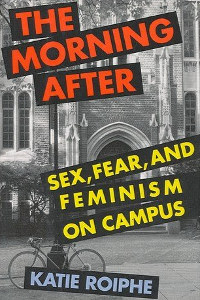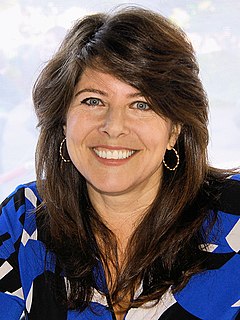
Naomi R. Wolf is an American liberal progressive feminist author, journalist, and former political advisor to Al Gore and Bill Clinton.

Sexual Personae: Art and Decadence from Nefertiti to Emily Dickinson is a 1990 work about sexual decadence in Western literature and the visual arts by scholar Camille Paglia, in which the author addresses major artists and writers such as Donatello, Sandro Botticelli, Leonardo da Vinci, Edmund Spenser, William Shakespeare, Johann Wolfgang von Goethe, Samuel Taylor Coleridge, Lord Byron, Emily Brontë, and Oscar Wilde. Following Nietzsche, Paglia argues that the primary conflict in Western culture is between the binary forces of the Apollonian and Dionysian, Apollo being associated with order and symmetry, and Dionysus with chaos, disorder, and nature. The book received critical reviews from numerous feminist scholars, but was praised by some literary critics.
Individualist feminism, sometimes also grouped with libertarian feminism, is feminist ideas which emphasize individualism.

Christina Marie Hoff Sommers is an American author and philosopher. Specializing in ethics, she is a resident scholar at the American Enterprise Institute. Sommers is known for her critique of contemporary feminism. Her work includes the books Who Stole Feminism? (1994) and The War Against Boys (2000). She also hosts a video blog called The Factual Feminist.

Katie Roiphe is an American author and journalist. She is best known as the author of the non-fiction examination The Morning After: Fear, Sex and Feminism (1994). She is also the author of Last Night in Paradise: Sex and Morals at the Century's End (1997), and the 2007 study of writers and marriage, Uncommon Arrangements. Her 2001 novel Still She Haunts Me is an imagining of the relationship between Charles Dodgson and Alice Liddell, the real-life model for Dodgson's Alice's Adventures in Wonderland. She is also known for allegedly planning to out the creator of the Shitty Media Men list in an article for Harper's magazine.
The term postfeminism is used to describe reactions against contradictions and absences in feminism, especially second-wave feminism and third-wave feminism. The term postfeminism is sometimes confused with subsequent feminisms such as 4th wave-feminism, and "women of color feminism".
The Independent Women's Forum (IWF) is a conservative American non-profit organization focused on economic policy issues of concern to women. IWF was founded by activist Rosalie Silberman to promote a "conservative alternative to feminist tenets" following the controversial Supreme Court nomination of Clarence Thomas in 1992. IWF's sister organization is the Independent Women's Voice (IWV), a 501(c)(4) organization.
Victim feminism is a term used by some liberal and libertarian feminists in the 1990s to contrast their conceptions of feminism with other feminists who they view as reinforcing the idea that women are weak or lacking in agency, and therefore need to be protected. Amongst sociologists, it has come more into use to describe a similar manifestation of feminism in the 2010s, particularly on college campuses in the US, part of a rising moral "culture of victimhood", as opposed to other dominant moral cultures like the "culture of honor" and the "culture of dignity".
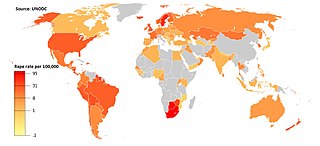
Rape culture is a sociological concept for a setting in which rape is pervasive and normalized due to societal attitudes about gender and sexuality. Behaviors commonly associated with rape culture include victim blaming, slut-shaming, sexual objectification, trivializing rape, denial of widespread rape, refusing to acknowledge the harm caused by sexual violence, or some combination of these. It has been used to describe and explain behavior within social groups, including prison rape and in conflict areas where war rape is used as psychological warfare. Entire societies have been alleged to be rape cultures.
Date rape is a form of acquaintance rape and dating violence. The two phrases are often used interchangeably, but date rape specifically refers to a rape in which there has been some sort of romantic or potentially sexual relationship between the two parties. Acquaintance rape also includes rapes in which the victim and perpetrator have been in a non-romantic, non-sexual relationship, for example as co-workers or neighbors.
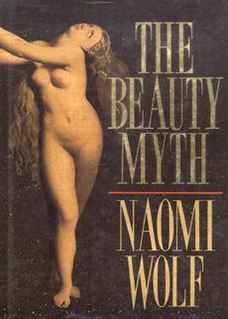
The Beauty Myth: How Images of Beauty Are Used Against Women is a nonfiction book by Naomi Wolf, originally published in 1990 by Chatto & Windus in the UK and William Morrow & Co (1991) in the United States. It was republished in 2002 by HarperPerennial with a new introduction.
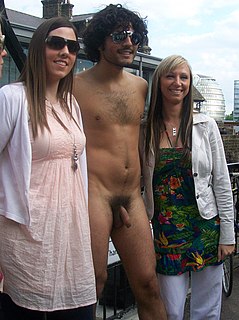
Clothed female, naked male (CFNM) is a genre of erotica based on the real or imagined interaction of one or more nude men and one or more clothed women.

Sexual Politics is a 1970 book by Kate Millett, based on her PhD dissertation. The book is regarded as a classic of feminism and one of radical feminism's key texts.
Equity feminism is a form of liberal feminism that advocates the state's equal treatment of women and men, without challenging inequalities perpetuated by employers, educational and religious institutions, and other elements of society. The concept has been discussed since the 1980s. Equity feminism has been defined and classified as a kind of classically liberal or libertarian feminism, in contrast with social feminism, difference feminism, gender feminism, and equality feminism.
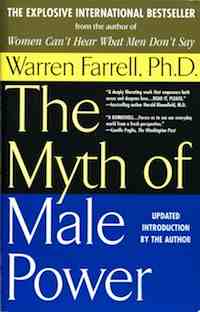
The Myth of Male Power: Why Men are the Disposable Sex is a 1993 book by Warren Farrell, in which the author argues that the widespread perception of men having inordinate social and economic power is false, and that men are systematically disadvantaged in many ways.

Camille Anna Paglia is an American feminist academic and social critic. Paglia has been a professor at the University of the Arts in Philadelphia, Pennsylvania, since 1984. She is critical of many aspects of modern culture and is the author of Sexual Personae: Art and Decadence from Nefertiti to Emily Dickinson (1990) and other books. She is also a critic of contemporary American feminism and of post-structuralism, as well as a commentator on multiple aspects of American culture such as its visual art, music, and film history.

Against Our Will: Men, Women and Rape is a 1975 book about rape by Susan Brownmiller, in which the author argues that rape is "a conscious process of intimidation by which all men keep all women in a state of fear." The book is widely credited with changing public outlooks and attitudes about rape. Some commentators, including sociobiologists, criticized the book and rejected its conclusions.

Who Stole Feminism? How Women Have Betrayed Women is a 1994 book about American feminism by Christina Hoff Sommers, a writer who was at that time a philosophy professor at Clark University. Sommers argues that there is a split between equity feminism and what she terms "gender feminism". Sommers contends that equity feminists seek equal legal rights for women and men, while gender feminists seek to counteract historical inequalities based on gender. Sommers argues that gender feminists have made false claims about issues such as anorexia and domestic battery and exerted a harmful influence on American college campuses. Who Stole Feminism? received wide attention for its attack on American feminism, and it was given highly polarized reviews divided between conservative and liberal commentators. Some reviewers praised the book, while others found it flawed.

I Never Called It Rape is a 1988 book by journalist Robin Warshaw. The book focuses on the hidden epidemic of acquaintance and date rape. The book is largely based on a nationwide study in the United States, the Ms. Magazine Campus Project on Sexual Assault. The title references the finding in the study that 73% of women whose sexual assault met the definition of rape did not identify their experience as such.
Gray rape or grey rape is sex for which consent is unclear. The term was popularized by Laura Sessions Stepp in her 2007 Cosmopolitan article "A New Kind of Date Rape", which says gray rape is "somewhere between consent and denial and is even more confusing than date rape because often both parties are unsure of who wanted what". The term "gray rape" has been criticized. Lisa Jervis, founder of Bitch magazine, argued that gray rape and date rape "are the same thing", and that the popularization of the gray rape concept constituted a backlash against women's sexual empowerment and risked rolling back the gains women had made in having rape taken seriously.
